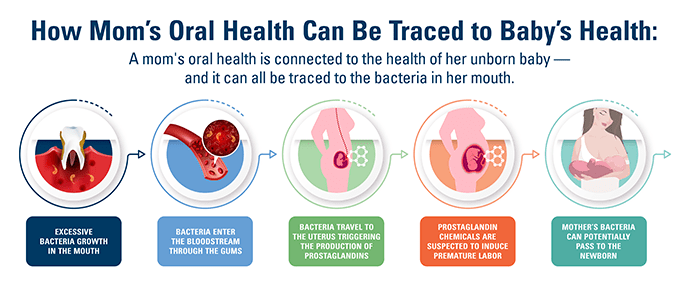ENJOY AN EXTRA 10% OFF YOUR FIRST ORDER
When you subscribe to ProBioraHealth.com emails
May 8, 2023
A woman’s body goes through many changes during pregnancy, most intended to help guide her baby safely into the world. Women’s mouths are no exception. But the changes that occur during pregnancy wreak havoc on most expectant moms’ oral health, leading to concerning health risks for both mom and baby.
Changing hormones and eating habits, and other factors, increase the risk for oral health problems in pregnant women. In the U.S. alone, nearly 60 to 75% of pregnant women have gum disease, an early stage of periodontal disease, causing gums to become red and swollen from inflammation.1 Left untreated, periodontal disease causes serious infection leading to chronic inflammation in the gums. This affects the bone that supports the teeth, potentially leading to tooth loss or dangerous bacteria in the bloodstream.
For baby, research has found an association between periodontitis and poor pregnancy outcomes, including preterm birth and low birth weight.2 Bacteria from the mouth travel to the uterus, triggering the production of prostaglandins, chemicals that are suspected to induce premature labor. Moms with gum disease also predispose their babies to cavities and gum disease later in life.
Adding to the issue, the majority of U.S. women do not have a dental cleaning during pregnancy, with only 46% of women seeking this safe, important routine procedure that is recommended every six months, at least.3 Additionally, one in four women of childbearing age have untreated cavities.4
The root of the concern: increasing levels of bad bacteria in the mouth
A woman’s changing estrogen and progesterone hormone levels increase the amount of biofilm-plaque on her teeth and gums. Plaque contains large amount of pathogenic (“bad”) bacteria, which is the cause of bad breath, tooth decay, cavities, gum disease, and more. Combine this with decreases in saliva flow, increased acidity in the mouth due to nausea and vomiting, food cravings for unhealthy foods and changes to a woman’s diet, the level of bad, disease-causing bacteria in the mouth can rise significantly. This can lead to a bacterial imbalance and poor oral health.
Risks for baby after birth
Poor oral health in moms remains a concern for children even after they are born. Women with high levels of bad bacteria in their mouth can transmit these bacteria from their mouth to the mouth of their baby.5 For example, mom sticks a baby’s pacifier in her mouth and then in the mouth of her child. Also, children of mothers who have high levels of untreated cavities or tooth loss are three times more likely to have cavities as a child.6

Supporting your mouth’s health during pregnancy
The good news is that supporting your mouth’s health during pregnancy has never been easier. In addition to brushing twice a day with a fluoride toothpaste and seeing your dentist, adding ProBiora probiotics for your mouth to your nightly routine after brushing is one of the simplest steps to keep your mouth at its healthiest.
Similar to how probiotics for the gut work, ProBiora’s patented blend of bacteria that are native to the oral cavity replenish the good bacteria needed for a healthy mouth. This patented blend, ProBiora3, has been clinically proven to fight the mouth’s bad bacteria that cause bad breath, tooth decay, cavities, gum disease, and more. When taken daily, the good bacteria in ProBiora’s Professional Strength also help to restore the mouth’s natural balance (biome), helping to keep your teeth and gums healthy.
Other ways to help support your oral health during pregnancy include:
Pregnant women should schedule an appointment with their dentist right away. Quick examination and treatment can help to identify and prevent problems for mom and baby.
References:
1 American Dental Association Council on Access, Prevention, and Interprofessional Relations, 2006.
2 Corbella S, Taschieri S, Del Fabbro M, Francetti L, Weinstein R, Ferrazzi E. Adverse pregnancy outcomes and periodontitis: A systematic review and meta-analysis exploring potential association. Quintessence Int. 2016 Mar;47(3):193-204. doi: 10.3290/j.qi.a34980.
4 Lindquist B, Emilson CG. Colonization of Streptococcus mutans and Streptococcus sobrinus genotypes and caries development in children to mothers harboring both species. Caries Res. 2004;38(2):95-103.
5 Azofeifa A, Yeung LF, Alverson CJ, Beltrán‐Aguilar E. Dental caries and periodontal disease among U.S. pregnant women and nonpregnant women of reproductive age, National Health and Nutrition Examination Survey, 1999–2004. Journal of Public Health Dentistry, 2016;76: 320-329. doi:10.1111/jphd.12159.
6 Dye BA, Vargas CM, Lee JJ, Magder L, Tinanoff N. Assessing the Relationship Between Children’s Oral Health Status and That of Their Mothers. J Am Dent Assoc. 2011;142(2), 173-183. doi:10.14219/jada.archive.2011.0061.